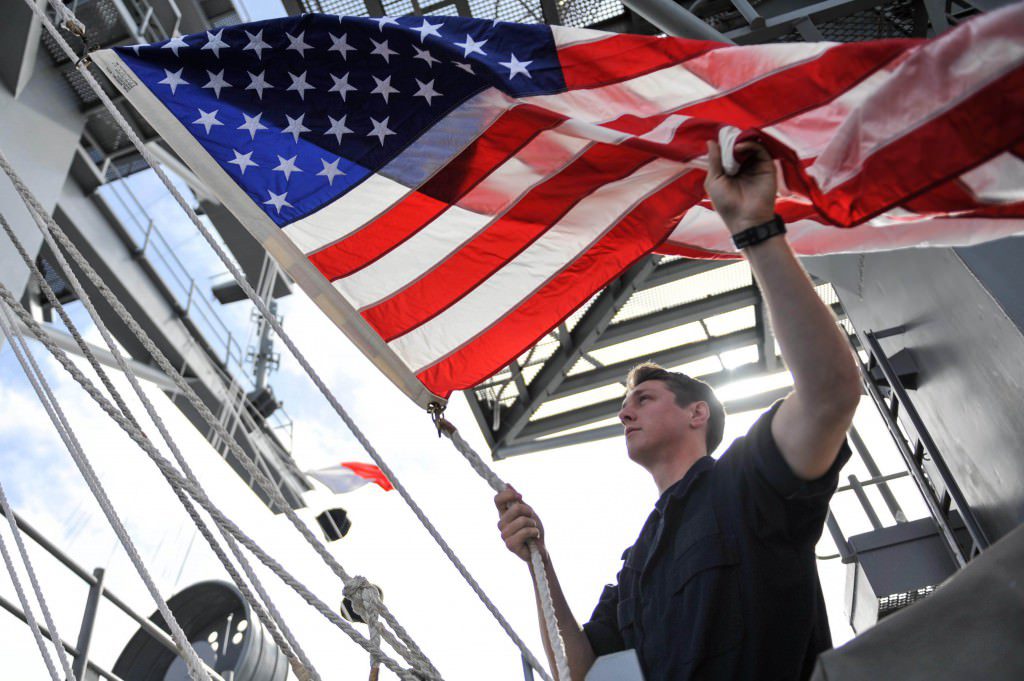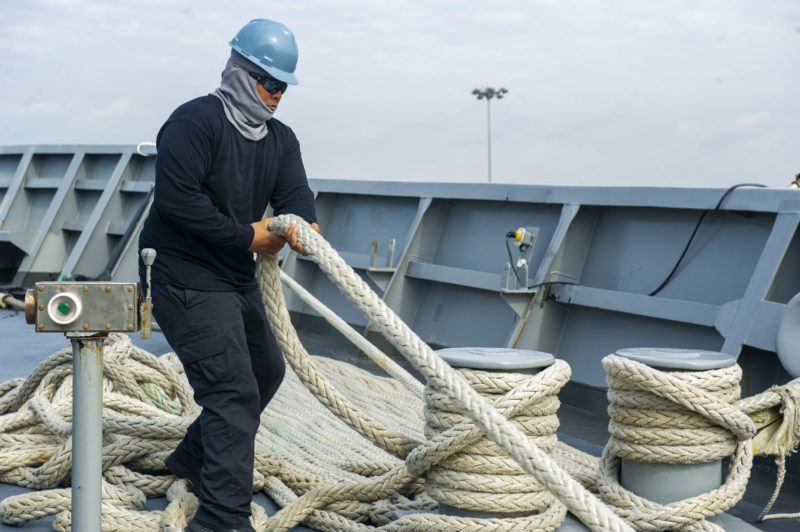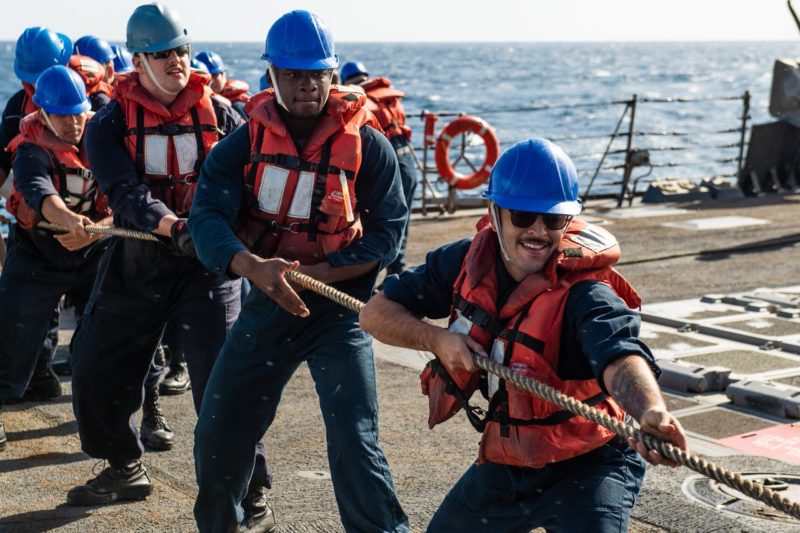Hung Cao – A Navy Diver In The Pentagon Briefing Room
Hung Cao and the Fight to Rebuild America’s Maritime Power Before the Next War Arrives by Captain John Konrad (gCaptain) The first thing you notice about the US Navy’s Undersecretary...

UPDATE: Scroll to the bottom for an update on the possible movement of US Flagged ships behind French naval convoy
gCaptain has received reports that the French Navy is withdrawing from the US lead Operation Prosperity Guardian over a dispute about which ships get escort priority. An urgent report by Dr. Sal Mercogliano shows they are already escorting French-owned merchant ships through while about a half dozen US Flag ships remain stranded – without adequate US Naval protection – within range of Houthi missiles.
The safety of US-flagged ships, particularly those stranded with military cargo near the Red Sea, is of immediate concern. The lack of adequate military protection has left these vessels – some have been waiting for naval escort for over a week – vulnerable, as evidenced by the recent rocket attack on a US-flagged tanker delivering explosive cargo to Israel. This situation raises serious questions about our commitment to safeguarding our maritime assets.

Today’s lack of priority for US-flagged ships is historically significant. Since the founding of the republic, the US Navy has been the protector of the US Merchant Marine, a responsibility deeply embedded in our national defense strategy. In recent years too all five military branches have worked to protect American ships
During Operation Iraqi Freedom in 2003, US merchant ships received comprehensive protection while navigating strategically important regions. As they passed through the Suez Canal, Air Force overflights offered an additional layer of security against potential threats. In the Persian Gulf, these ships benefited from close naval support, ensuring safe passage in these contentious waters. Additionally, US Army National Guard soldiers from Puerto Rico were deployed on these ships, providing an armed presence to deter and respond to any hostile actions.
In 2005, the US Navy undertook a significant operation to escort the “Prestige New York”, a vessel carrying Department of Defense cargo. This operation underscored the Navy’s commitment to secure critical defense-related shipments and highlighted the strategic importance of naval escorts in ensuring the safe transit of valuable cargo.
Responding to the surge in piracy, particularly off the coast of Somalia, the US Navy deployed 20-man SEAL detachments aboard the “Liberty Sun” and “Maersk Alabama” in April 2009. These teams, equipped with 50mm caliber weapons, were crucial in fortifying the ships against pirate attacks. The mounting of weapons on the bridge wings was a tactical measure to enhance the ships’ defensive capabilities, as demonstrated in video footage from the period.
Between 2010 and 2017, the US Navy played a pivotal role in the International Recommended Transit Corridor (IRTC) in the Gulf of Aden. In collaboration with various international maritime security organizations, the Navy helped arrange timed piracy convoys and prioritized US Merchant shipping. This initiative, under the umbrella of the Combined Task Force 151, was instrumental in mitigating piracy risks in a region notorious for such threats.
Since 2019, the US Navy has been actively escorting US-flagged vessels through the Straits of Hormuz. This strategic waterway, known for its geopolitical significance, has been a focal point for ensuring the safety of maritime traffic, particularly in light of regional tensions and potential threats to navigation.
In August 2023, there was a proposal by VADM Brad Cooper, Commander of the US Navy Central Command, to embark military security personnel on merchant ships in the Middle East, specifically focusing on tankers in and around the Strait of Hormuz. This initiative, however, was ultimately not implemented.
The consistent theme across these examples is the unwavering commitment of the US Navy to protect its commercial maritime interests. This protection has been adaptive, responding to evolving threats and geopolitical changes, and has played a critical role in ensuring the safe passage of US-flagged vessels in some of the world’s most challenging and dangerous waters… but today that once unwavering commitment has either been lost entirely or delayed for over a week.
This problem highlights a critical issue regarding the readiness and trust between the United States Navy and Merchant Marine. In times of national security crises, it’s essential that US Merchant Marine service members feel supported and protected by their leadership and the nation. If mariners lack confidence in the Navy’s response to crises, it will lead to a significant decline in morale and readiness, which is detrimental in times of conflict.
The immediate and decisive support from the Navy – TODAY – is crucial to maintaining the trust and willingness of mariners to serve during the war.

Sources inside US shipping companies inform gCaptain that the US Transportation Command (TRANSCOM) and the Navy’s Naval Cooperation and Guidance for Shipping (NCAGS), are working hard on a plan to escort and protect these ships. This work needs to be championed at the highest levels of government and expedited by the Joint Chiefs of Staff and White House as soon as possible because every moment US Flag ships remain in the area unnecessarily increases the risk they will be targeted by Houthis.
I urge our leaders, including Cabinet Secretary Pete Buttigieg and US Maritime Service Commandant Ann Phillips, to wake up and prioritize this situation with the urgency and seriousness it warrants. Our Merchant Mariners are not just a matter of national pride; they are a cornerstone of our national defense and economic stability.
The time for action is now. The United States military must reaffirm its commitment to protecting US Merchant Marine sailors and ensure that our naval strategy is in line with the evolving challenges of today’s geopolitical landscape.
AIS data shows that the French Navy may be working with the US Navy to clear the backlog of US Flagged ships in the Red Sea:

Sign up for gCaptain’s newsletter and never miss an update

Subscribe to gCaptain Daily and stay informed with the latest global maritime and offshore news
Essential news coupled with the finest maritime content sourced from across the globe.
Sign Up